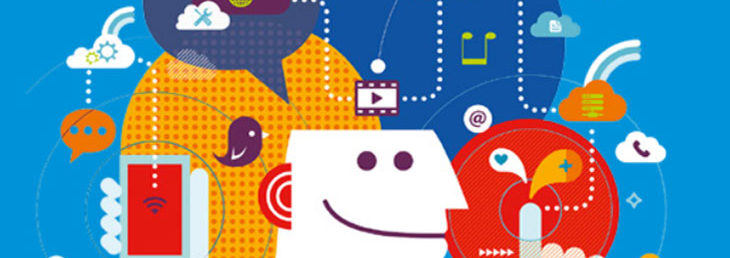
29 Mar Co-Session #31: Reinventing organizations towards new ways of working
Modern technological transformations, which are so disruptive in so many contexts, will make it possible and even obligatory for us to work in different ways to how we have been doing over the last century. Companies can take full advantage of the benefits of using new emerging technologies if they transform their organization by exploring new ways for the professionals who work there to relate to one another. Perhaps this is why we wanted to dedicate this Co-Session to finding out more about these new ways of relating to each other in the workplace. To do this, we were able to draw on the contributions of people who have thought a great deal about this issue and who also have the experience of having put innovative ways of working into practice.
Towards a future without work?
Alfons Cornella, the founder of Co-Society, kicked off the day’s proceedings. He did so by asking a question that is difficult to answer: Are we heading towards a post-work world? Would we even be prepared for this? Talking about new ways of working obviously means talking about new tools, processes, methodologies and even new policies. But it also makes us wonder whether it is human to work and, more specifically, whether the way we work right now is humane. This idea will undoubtedly become more relevant over time as the automation of many of the tasks that make up our jobs increases and, in turn, the need to rehumanize work perhaps grows.
Reinventing organizations
For David Martí, Manager of the Barcelona Municipal Conservatory of Music, companies and organizations are experiencing a growing desire for change. However, as the saying goes, “this is easier said than done”. The problem is that this change is not easy when we have followed the current or old models for so long in our professional and personal growth. In the first place, the desire to change organizations stumbles at the starting block with a great deal of resistance from within. David has experienced this first-hand in his professional life in the world of music, where some of the projects he has been involved in have specifically consisted of shattering attitudes, rules and ways of making and creating an orchestra that have been considered unalterable for two centuries.
Frederic Laloux’s book “Reinventing Organizations” has been an important source of inspiration for David, for whom its main lesson is that there is no one model or recipe to create new ways of working and put them into practice. Instead, each group, each organization, has to find them within itself. Firstly, it does this by listening, controlling egos and believing and trusting in individual responsibility. If possible, this can also be done by educating people in another organizational and relational culture, and, of course, by assuming that nothing or nobody can try to change for the better without taking any risks.
Talent platforms
Bernat Guitart, CEO of Appfutura, a marketplace for developers of mobile applications, contributed his vision and experience on a new way of working that is increasingly gaining ground in the global talent market, which has at its center freelance professionals with the ability to offer their knowledge and skills on a temporary basis and for a specific project, from anywhere and for anyone in the world. This way of working still mostly concentrates on technological occupations, although in this type of employment there is also a growing demand for professionals in fields like communication, marketing and design. A growing number of younger self-employed workers, considered as digital natives and nicknamed millennials, are opting for this kind of relationship with companies. On many occasions, it is because they prefer it this way.
The Appfutura platform is not aimed at freelancers but at companies. However, many of the new factors of this new form of employment relationship coincide in both cases. Bernart Guitart pointed out the importance of elements like digital reputation, which is a summary of all the assessments made by different clients, as well as the need to exhaustively document the work required, making the rules of the game very clear and specific, and the use of contractual payment agreements like escrow. All of these elements are strongly linked to the type of digital tools that allow professional and working relationships to be established between people and organizations from all around the world in a growing global talent market.
Transformation is not enough
Jordi Vilà, President of Grupo Nexe, has been managing transformation processes in companies for 25 years. In general, these organizations share a common denominator in their need for change. These are companies with a highly involved family element, great faith in an initial product or service that was the source of their success, and a very unique personality in the way they work. Later on, big changes in their markets or the need for growth demand a transformation that is very difficult to bring about. The problem for many organizations these days is aggravated when transformation is not enough: they need mutation, changes to their DNA.
For Jordi Vilà, the aspects that most limit change are precisely those relating to the identity and organizational culture of each company. This unique culture, this particular way of working, may have made sense and been the reason for success in the past, but it may be counterproductive in the present. The relevant thing in these cases is to be aware of it and know what type of organization we are: are we egotistical and arrogant, or, on the other side of the coin, responsible and constructive? Cultural changes in any organization are mostly in need of inspiring leaders. The key is usually in understanding a company as a person, understanding its “psychology” (its fears, security, motivations, etc.). Just like people, organizations will only be healthy if they take care of themselves.
Working with passion
Ampans is a foundation that has been around for over 50 years, eliminating barriers for the social inclusion of people with mental disabilities. At this Co-Session, its CEO, Toni Espinal, shared his experience on how to successfully manage an organization that has the second largest number of employees in the Catalan county of Bages and put into practice some very different ways of working. According to Espinal, the key to its smooth running lies in transferring its culture of care for disabled people to its workers too, promoting qualities like passion, individual responsibility, empowerment and collaboration.
Running Ampans includes many practices that are counterintuitive to the classic rules of management. For example, people are selected not so much based on their resume as on their aptitude and the chance of them fitting in with existing teams. Above all, the staff are urged to be strongly involved in the organization and, by default, this means striving for long-term relationships: “We want our employees to retire with us”. Although the Foundation employs some 2,500 people, it has a fairly flat management structure. For example, it does not have a technical management team. Work teams are made up of 10-12 people and enjoy great independence. “All of this implies a certain type of leadership, of course,” says Toni Espinal. “We are clear that people do not work for their boss, but for the mission of the Foundation and for its clients”.



Sorry, the comment form is closed at this time.